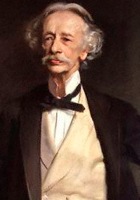The Toys Poem by Coventry Patmore
The Toys
My little Son, who look'd from thoughtful eyes
And moved and spoke in quiet grown-up wise,
Having my law the seventh time disobey'd,
I struck him, and dismiss'd
With hard words and unkiss'd,
—His Mother, who was patient, being dead.
Then, fearing lest his grief should hinder sleep,
I visited his bed,
But found him slumbering deep,
With darken'd eyelids, and their lashes yet
From his late sobbing wet.
And I, with moan,
Kissing away his tears, left others of my own;
For, on a table drawn beside his head,
He had put, within his reach,
A box of counters and a red-vein'd stone,
A piece of glass abraded by the beach,
And six or seven shells,
A bottle with bluebells,
And two French copper coins, ranged there with careful art,
To comfort his sad heart.
So when that night I pray'd
To God, I wept, and said:
Ah, when at last we lie with trancèd breath,
Not vexing Thee in death,
And Thou rememberest of what toys
We made our joys,
How weakly understood
Thy great commanded good,
Then, fatherly not less
Than I whom Thou hast moulded from the clay,
Thou'lt leave Thy wrath, and say,
'I will be sorry for their childishness.'
Symbolism is in the eyes of the beholder. The father in this setting does not represent God any more than the son represents Jesus. What makes this poem live is the sadness in the human condition, that repeats itself ad infinitum. Who has not felt the unexpected wrath of someone they worship? Who has not hurt those whose very existence is intimately connected to his own? Who has not suffered the remorse of having acted hastily, foolishly and even viciously-characteristics so remote from what God is. This is not about life eternal, but about life temporal.
The poem Toys is very symbolic in its setting. Even though the poet speaks of his little son, from a broader perspective, the poem underlies the 'comfort' man resorts to, when God admonishes him... When man is buffeted for his faults, or when he encounters certain undesirable happenings in his life, he immediately resorts to other resorts to comfort and solace him, thus moving away from his creator. But still, God, much akin to Francis Thompson's 'Hound of Heaven, ' in all His grace forgives man for his shortcomings and kisses him (blesses him with His heavenly comfort) . The creator’s concern for His creation and the creation’s antipathy to the love of God are manifested in this poem. The slumber of the child represents the forgetfulness and the sheer childish callousness of children towards elders (here God) . The lines “anged there with careful art, To comfort his sad heart” are of particular significance because, man in his love of the world, forgets whatever blessings he has derived from the Almighty and turns to the world in times of distress. The poem has a great import on the love of God and the antipathy of man.
This poem has not been translated into any other language yet.
I would like to translate this poem
My most favorite poem and poet.